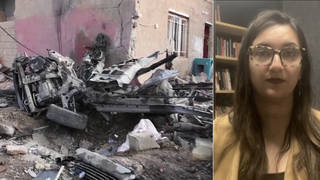
Related
Topics
Public sector unions in Iraq were outlawed by Saddam Hussein in 1987. Now, the Iraqi labor movement is protesting plans by U.S. occupation authorities to privatize state owned industries. We speak with the president of the General Union of Oil Workers. [includes rush transcript]
Though we don’t often hear about the labor movement in Iraq, the country has a long history of union activism that dates back to the 1920’s when the British first began exporting oil from the country. Saddam Hussein banned unions for public workers in 1987 because he feared a progressive movement would topple his dictatorship. When the U.S occupation of Iraq began, the U.S authorities refused to repeal that law. Instead in September of 2003, Paul Bremer, the top U.S. official overseeing the Iraqi occupation, issued an order to privatize the country’s state owned industries, which include its oil industry.
But the Iraqi people are speaking out against privatization. At the end of May, a large conference was held in Basra that focused on the threat of privatization of Iraq’s oil fields. Oil workers voiced their opposition to privatization and to selling their oil to foreign companies at discounted prices. They also called for an end to the occupation and a withdrawal of foreign troops.
- Hassan Juma’a Awad al-Asade, president of the General Union of Oil Workers in Iraq. He is touring the U.S. along with five other trade unionists from Iraq. He joins us in our studio in D.C. Mohamed Taam is translating.
- David Bacon, a veteran labor journalist who recently returned from Basra. He has an op-ed piece about Iraqi unions in yesterday’s San Francisco Chronicle.
Transcript
AMY GOODMAN: Joining us now in California is David Bacon, long-time labor journalist who recently returned from Basra, has an Op-Ed piece about Iraqi unions in yesterday’s San Francisco Chronicle. It’s good to have you with us, David. Can you talk about the situation of the union workers, the oil industry, in Iraq?
DAVID BACON: Well, the oil union is the largest single union in Iraq, the most powerful union in Iraq, representing about 23,000 workers in the oil industry in the southern part of the country, which is where most Iraqi oil comes from. So, on the one hand it’s a very powerful union. It’s used its influence to help other groups of workers in the south get organized in the ports and the electrical power generating stations and the railroads. So it’s kind of the heart of the labor movement in southern Iraq.
But the union is still under the pressure of these Bremer orders. On the one hand, orders that are moving forward on the privatization of Iraqi state-owned enterprises, including oil and other industrial enterprises, and these orders were written into Iraq’s transitional laws, so even though Bremer is gone, the present Iraqi government is still bound by the orders that Bremer issued. And unions in Iraq, like the oil workers union, feel that one reason why they continue to enforce the Saddam Hussein law that prohibits unions in the public sector in Iraq is because the occupation wants to keep unions weak while they move forward with the privatization plans.
Just recently, for instance, there was a proposal to use Iraq’s foreign debt, and remember, under Saddam Hussein, Iraq accumulated an enormous foreign debt in part to the U.S. because of the purchase of war materials. Now, instead of forgiving that debt, because it was the debt accumulated for these kind of illegitimate purposes, the U.S. and Britain are trying to use the debt pressure to require Iraq to implement privatization orders and also to sign agreements with transnational oil companies that would essentially allow them to get a hold of Iraqi oil at bargain basement prices.
AMY GOODMAN: In our Washington studio, we are joined by the founding member of the General Union of Oil Workers, Hassan Juma’a Awad al-Asade. He is being translated by Mohamed Taam. We don’t have much time, unfortunately, but can you talk about how oil workers are organizing today in Iraq?
HASSAN JUMA’A AWAD AL-ASADE: [translated] The oil workers in Iraq, they live in a condition that is as much like the rest of the Iraqi workers throughout the country. It doesn’t achieve the status where it enjoys its full rights ’til now, so far. The oil section workers, they decided to take over a construction of Iraq after the occupation forces came in. And just after May 20, 2003, they started to reconstruct, rehabilitate all the institutions, but has been distracted by the allied forces, so in a way, they can revitalize the important sector in Iraq, because many — because the condition of many institutions in Iraq depends directly and straightly on the oil production, such as the electricity and almost everything that has to do with everyday life of the Iraqi citizens. Adding to that the military pressure on the workers and the oilfields, but they defeated all these challenges. And with the limited means, they tried to reconstruct what has been destructed. After one month occupation came in, people tried to start again the oil export throughout Iraq revitalized, and they achieved to export oil with 800 million barrels, which is so amazing without the intervention of any other foreign force except the Iraqi workers, who, as I said, are seeing a great deal of difficulties and obstacles.
AMY GOODMAN: On that note, I want to thank you very much for joining us, Hassan Juma’a Awad al-Asade, founding member of the General Union of Oil Workers, elected president July of 2004, translated by Mohamed Taam; David Bacon, veteran labor journalist joining us from Berkeley, reporting for KPFA, among many other news organizations.












Media Options